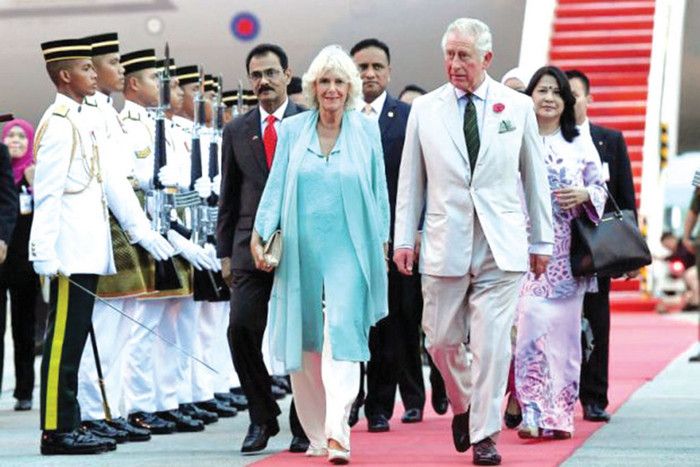Did Charles mention climate change when he toured the provinces?


By Mariam Mokhtar
Charles, the Prince of Wales and Camilla, the Duchess of Cornwall, were on a seven-day tour of Malaysia, in November. Their itinerary included visits to Kuala Lumpur, Perak, Penang and Sarawak.
The heir to the British throne is usually very vocal about his pet subjects, like architecture, climate change and the environment. Some people call him the “Meddling prince”; others say he is just concerned about the world we will leave behind for future generations.
He is one of the authors of a Ladybird book on “Climate Change”, which he launched last January. He warned us that we should act on climate change to avoid “potentially devastating consequences”. The aim of the book was to raise public awareness and guide us on this “very pressing issue”. Charles is also a fierce critic of climate change deniers.
On their arrival in Malaysia, Charles and Camilla attended a dinner to celebrate 60 years of UK-Malaysian diplomatic relations. He spoke about overpopulation in cities, the threat to the world’s oceans and the role of the Commonwealth. He said, “For the resolution of all these issues, the Commonwealth should, and does, have a pivotal role to play.
“Representing a third of the world’s population and a fifth of its land-mass, it can draw on a uniquely wide range of national contexts, experiences, traditions and, above all, professional associations – something, of course, which makes the Commonwealth unlike anything else in the world – for the solutions that we all so desperately need now.”
When Charles visited Perak, he made a trip to the Royal Belum State Park, where he saw first hand the natural beauty of the protected forest. He was also briefed on the steps the state government would take, to make the park a nationally important tiger conservation site.
One wonders if anyone briefed the Prince about the “encroachment” of Orang Asli (OA) in the Royal Belum State Park. Development and progress has turned thousands of acres of jungle, the natural habitat of the OA, into oil palm plantations, and mines. There is also extensive illegal logging.
Some pockets may have been turned into protected forest spaces, meaning, that the OA and wildlife, have to fight for their existence and survival.
Two years ago, at the Paris climate change summit, Charles said that the rights of the indigenous peoples have to be recognised, as part of the effort to tackle climate change. He stressed that forests should be restored and the tribal peoples’ land rights respected. He called on the government ministers and indigenous leaders present at the summit, to “properly safeguard their reserves, traditions and culture.”
Was Charles aware that our OA face intense pressure on their way of life? Charles has stressed that indigenous peoples are the natural guardians of the forest and that “their lives are more intimately intertwined with the forests than our own”.
His words should have made an impact when he visited Sarawak the day after his tour of Royal Belum, Taiping and Kuala Kangsar.
The indigenous tribes in Sarawak, like the OA in peninsular Malaysia, have been turfed out of their lands by logging, oil palm plantations and the building of dams. Their hunting grounds have been destroyed, their rivers polluted and their ancestral lands desecrated. With their drinking water contaminated by chemicals or silting, with water sources for farming drying up, the survival of the indigenous people is at stake.
With large areas of the jungle destroyed, the local tribes people cannot preserve their way of life. The people who issue the permits to log, to open up plantations or build dams, neither care nor realise the impact of greenhouse gases and global warming.
We have already seen the effects of extremes of climate, with prolonged and regular periods of drought and flooding, and more extreme weather patterns. With mangrove swamps being cleared to make way for prawn farming or development, coastal areas are more prone to flooding and changes in sea level. If Prince Charles had toured coastal areas near Taiping, he may have seen how development is encroaching into our estuaries.
When their tour of Sarawak was over, the royal couple flew to Penang, where some areas have been devastated by floods. What must the Prince think of the flooding? The things he is passionate about, were obvious during his tour.
One wonders if the Prince had a chance to advise his provincial hosts about excessive building on the coastline and hill-slopes, land reclamation, and the cutting down of trees which may be 500 years old and which protect the fertility of our soils and rivers.
Was the Prince able to convince Malaysians about the importance of tackling climate change, or was he advised to keep quiet and not upset his hosts, because of the probability that a new arms deal is about to be signed between Malaysia and Britain?


